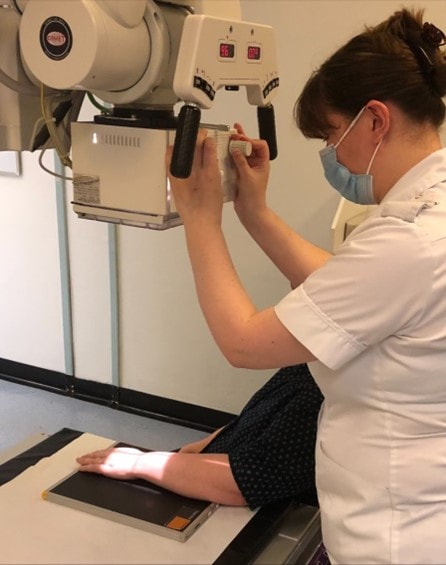Apprenticeships at ELHT
Click on the relevant box below for further support and guidance
Apply for an Apprenticeship (External applicants)
An apprenticeship is a real job where you learn, gain experience, and get paid. You’re an employee with a contract of employment. You can start an apprenticeship whether you’re starting your career, want a change or you're upskilling in your current job. You can have a previous qualification like a degree and still start an apprenticeship. By the end of an apprenticeship, you'll have the right skills and knowledge needed for your chosen career.
An apprenticeship is a real job where you learn, gain experience, and get paid. You’re an employee with a contract of employment. You can start an apprenticeship whether you’re starting your career, want a change or you're upskilling in your current job. You can have a previous qualification like a degree and still start an apprenticeship. By the end of an apprenticeship, you'll have the right skills and knowledge needed for your chosen career.
It can take between one and six years to complete an apprenticeship depending on which one you choose, what level it is and your previous experience. Apprenticeships are linked to an accredited course from Level 2 (intermediate) – Level 7 (Master’s degree) covering both clinical and non-clinical job roles.
All apprenticeships include elements of on and off the job training; some apprenticeships also require an assessment at the end of the programme to assess the learner’s ability and competence in their job role.
As an apprentice you will:
For further information, please click here.
- learn and train for a specific job
- get paid and receive holiday leave
- get hands-on experience in a real job
- study for at least 6 hours of your contracted working hours - delivered by the training provider
- complete assessments during and at the end of your apprenticeship
- be on a career path with lots of future potential
For further information, please click here.
Apprenticeships for ELHT employees
Apprenticeships are available for substantive staff at ELHT. Apprenticeships are linked to an accredited course from Level 2 to Level 7 covering both clinical and non-clinical roles.
When substantive staff enrol on an apprenticeship programme their job role and salary are not affected. Apprenticeships can take between one to six years to complete. The apprenticeship standard chosen must relate to the job role of the person who will be in learning.
If you are considering an apprenticeship to further your knowledge, up skill or develop in your role the first step to take is to have an open discussion with your manager.
For further information, please click here.
ELHT Apprenticeships for recruiting manager
It’s about new skills not just new people there are apprenticeship opportunities for current staff too. Apprenticeships should complement the service and should always be based on your business and skills needs.
Apprenticeships need to be embedded within the trusts workforce planning. This will ensure that the apprentice will have the ability to develop their career within East Lancashire Hospitals NHS trust.
There are several ways you can develop apprenticeship roles in your staffing plan:
- Offering current staff opportunities to up skill. We can use apprenticeship Levy funding for a current member of staff to undertake an apprenticeship, if the apprenticeship aligns with their current role whilst allowing the individual to acquire new skills and knowledge.
- Assess whether planned roles already in your business plans, could be offered as apprenticeships.
- When starting the recruitment process, you should consider whether the role you are looking to recruit could be filled by an apprentice, either at entry levels 2 and 3 or at a higher level 4-7.
You will need to decide on the most suitable level for the apprenticeship – this should align with the role and the responsibilities of the apprentice.
For further information, please click here.
ELHT Apprentice mentor guide
In the workplace, mentoring is about using your own experience and skill set to help a more junior colleague to maximise their own potential. Each mentoring relationship is unique; however you’ll typically work towards a set of core objectives. You’ll help your mentee to grow in confidence, learn new skills and provide key support enabling them to take control of their own personal development.
As a mentor, you may need to take on a variety of different roles, from coach, to facilitator, to counsellor. You’ll act as a sounding board, asking challenging questions to help your mentee to identify the best course of action for the task at hand. You’ll be a source of inspiration and help your mentee to carve a pathway to achieve their own professional aspirations.
Mentors should communicate with the apprentice's training provider and help the apprentice with any preparation that they need to do for their exams, coursework, and end-point assessments. Participating in any review meetings is also important in understanding the apprentice’s progress.
The value of mentoring in supporting a high-quality Apprenticeship programme is increasingly being recognised for its value in supporting the transition of young people into the workplace and in passing on skills and experience.
For further information, please click here.
Students looking to join the NHS as an apprentice
Apprenticeship vacancies are advertised on the hospital website, if you are over 16, live in England and are not in full time education you can apply for an apprenticeship.
Entry requirements depend on the sector and prior skills, if you have already achieved A levels you may still be expected to start at intermediate to build up your occupational skills.
If you have any enquiries please email - [email protected]












